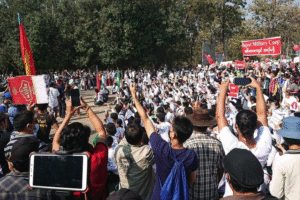By U Aung Tin Published by MMNN

U Kyaw Min, a respected legal scholar and national leader, has now twice made unsubstantiated claims against the Rohingya community. While his stature commands admiration, his recent remarks—particularly in the MCN interview dated 18 September 2020—require urgent scrutiny.
In that interview, U Kyaw Min alleged that Mujahids, backed by English and Japanese forces, massacred Rakhine villagers and destroyed over 500 villages. This narrative, lacking credible evidence, dangerously echoes the revisionist claims of ethnic extremists like Dr. Aye Chan and Dr. Aye Maung. It is deeply troubling that a figure of U Kyaw Min’s caliber would repeat such claims without reflection or verification.

Let us be clear: the Rohingya are not recent arrivals. According to university textbooks from the era of General Than Shwe, they were recognized as indigenous people who had settled in the region over 4,500 years ago—long before many of our ancestors arrived in Myanmar. To dismiss their history is not only unjust, it is historically inaccurate.
The 1942 massacres were not initiated by the Rohingya. Historical records, including those by Rakhine revolutionary leader Bon Pauk Tha Kyaw, confirm that the violence began in southern Rakhine, led by Sayadaw U Sein Ta of Kyauk Taw Min Pyar. The campaign of ethnic cleansing spread northward, and only after Rohingya survivors fled to the north did retaliatory violence occur. Even Rakhine historians acknowledge that approximately 7,000 Rakhine and 30,000 Rohingya were killed—a staggering toll that demands sober reflection.
If today’s leaders claim to know more than Bon Pauk Tha Kyaw, who witnessed and tried to stop the massacre himself, they must first read his book “Revolutionary Journey”. The truth is there, in plain sight.
Myanmar’s government has led one of the most brutal genocides in modern history. Despite years of international scrutiny, the Rohingya are still accused of being illegal immigrants. If we cannot recognize that they may be more indigenous than many of us, then we are unfit to lead. Such denial is not only irresponsible—it is shameful.
If U Kyaw Min or others require evidence, it is available. But to speak boldly about matters one does not fully understand, and to indirectly support or excuse genocide, is both morally and intellectually indefensible.
If we value history and dignity, we must apologize to the Rohingya.
To our Rakhine brothers and sisters: if genuine reconciliation is your goal, then it is time to reject the toxic distortions of history. Let us embrace the truth, learn from it, and pass on a legacy of justice and compassion to future generations.
Only then can we begin to heal.





